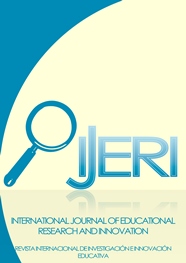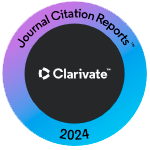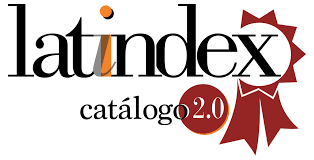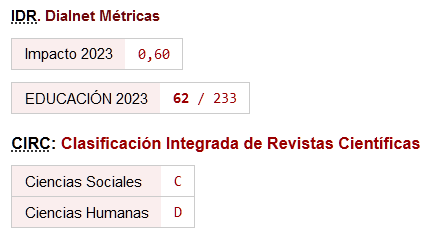Desarrollo de una Ecología de Recursos online para profesores de inglés como lengua extranjera (EFL) en una universidad japonesa durante la pandemia de COVID-19
DOI:
https://doi.org/10.46661/ijeri.5356Palabras clave:
COVID-19, Enseñanza remota de emergencia, inglés como idioma extranjero, universidades japonesas, desarrollo docenteResumen
La enseñanza del idioma inglés en las universidades japonesas se puede describir por su enfoque centrado en clases presenciales con relativamente poca actividad online. Por lo mismo, la transición de emergencia hacia la enseñanza a distancia durante abril de 2020 como respuesta a la pandemia de COVID-19 fue bastante complicada. Este artículo describe cómo los profesores de una facultad de inglés como Lengua Extranjera (EFL) de una universidad nacional en Japón, se coordinaron y unieron para ayudarse entre sí a través de varias guías online y la creación de grupos de apoyo de pares. Esta actividad se analiza en términos del desarrollo de una Ecología de Recursos (EoR) (Luckin, 2008) y una Comunidad de Práctica Online (Lave & Wenger, 1991). Los cuatro documentos colaborativos y el grupo de apoyo de pares que componen el EoR se describen en conjunto con ejemplos de este proceso de desarrollo docente. Al participar en la creación del EoR, los profesores no sólo aprendieron juntos cómo enseñar online en un contexto de emergencia, sino también ésta colaboración puede llegar a ser la base para una futura enseñanza online en una institución donde esto no había sucedido antes.
Descargas
Citas
Aoki, K. (2015). MOOCs and open education in Japan: The case of the Open University of Japan. In C.J. Bonk, M.M. Lee, T.C. Reeves & T.H. Reynolds (Eds.) MOOCs and Open Education Around the World (pp. 21-29). Abingdon, UK: Routledge.
Bozkurt, A., Jung, I., Xiao, J., Vladimirschi, V., Schuwer, R., Egorov, G., … Paskevicius, M. (2020). A global outlook to the interruption of education due to the COVID-19 pandemic: Navigating in a time of uncertainty and crisis. Asian Journal of Distance Education, 15(1), 1–126. https://doi.org/10.5281/zenodo.3878572
Canagarajah, A. S. (2012). Teacher development in a global profession: An autoethnography. TESOL Quarterly, 46, 258-279.
Cowie, N., & Sakui, K. (2014). Take your pick: Out-of-class, blended language and Web 2.0 projects, and online. The JALT CALL Journal, 10(3), 273-286. https://doi.org/10.29140/jaltcall.v10n3.180
Cowie, N., & Sakui, K. (2020a). Advice from the field: Tips for teaching online. Kobe JALT Journal, 2(1), 23-29.
Cowie, N., & Sakui, K. (2020b). Teacher and student-created videos in English Language Teaching. ELT Journal. http://dx.doi.org/10.1093/elt/ccaa054
Crawford, J., Butler-Henderson, K., Rudolph, J., & Glowatz, M. (2020). COVID-19: Twenty countries’ higher education intra-period digital pedagogy responses. Journal of Applied Teaching and Learning, 3(1). https://doi.org/10.37074/jalt.2020.3.1.7
Day, C. (1999). Developing Teachers: The Challenges of Lifelong Learning. London: Falmer Press.
Dewey, J. (1938) Experience and Education. New York: Kappa Delta Pi.
Ellis, R. (2008). The Study of Second Language Acquisition (Second Ed.). Oxford: Oxford University Press.
Goldie, J. (2016). Connectivism: A knowledge learning theory for the digital age? Medical Teacher, 38(10),1064-9. https://doi.org/10.3109/0142159X.2016.1173661
Goldstein, B. & Driver, P. (2014). Language Learning with Digital Video. Cambridge: Cambridge University Press.
González-Sanmamed, M., Estévez, I., Souto-Seijo, A., & Muñoz-Carril, P. (2020). Digital learning ecologies and professional development of university professors. [Ecologías digitales de aprendizaje y desarrollo profesional del docente universitario]. Comunicar, 62, 9-18. https://doi.org/10.3916/C62-2020-01
Hockly, N. (2015). Developments in online language learning. ELT Journal, 69(3), 308-13. https://doi.org/10.1093/elt/ccv020
Kolb, D. A. (1976). Learning Styles Inventory. Boston: McBer and Company.
Kolb. D. A. & Fry, R. (1975). Toward an applied theory of experiential learning. In C. Cooper (Ed.), Theories of Group Process (pp. 33-57). London: John Wiley.
Lave, J., & Wenger, E. (1991). Situated Learning: Legitimate Peripheral Participation. Cambridge: Cambridge University Press.
Luckin, R. (2008). The learner centric ecology of resources: A framework for using technology to scaffold learning. Computers & Education, 50, 449-462. https://doi.org/10.1016/j.compedu.2007.09.018
Miller, M. D. (2020). Going online in a hurry: What to do and where to start. The Chronicle of Higher Education. Retrieved from: https://www.chronicle.com/article/Going‐Online‐in‐a‐Hurry‐What/248207
National Institute for Digital Learning. (2020). Teaching Online – Resource Bank. Retrieved from: https://www.dcu.ie/nidl/resources/Swiftly-Moving-Online-Coronavirus.shtml
Poole, G. S. (2010). The Japanese Professor. Boston, MA: Sense.
Puentedura, R. R. (2010). SMAR and TPCK: Intro to Advanced Practice. Retrieved from: http://hippasus.com/resources/sweden2010/SAMR_TPCK_IntroToAdvanced Practice.pdf
Romeu-Fontanillas, T., Guitert-Catasús, M., Raffaghelli, J., & Sangrà, A. (2020). Mirroring learning ecologies of outstanding teachers to integrate ICTs in the classroom. [Ecologías de aprendizaje para usar las TIC inspirándose en docentes referentes]. Comunicar, 62, 31-42. https://doi.org/10.3916/C62-2020-03
Selwyn, N., & Jandrić, P. (2020). Postdigital living in the age of Covid-19: Unsettling what we see as possible. Postdigital Science and Education, 1-17. https://doi.org/10.1007/s42438-020-00166-9
Stanley, I. (2015). What impact does a change-agent have on faculty use of technology? The JALT CALL Journal, 11(2), 105-122. https://doi.org/10.29140/jaltcall.v11n2.187
Wang, S., Iwata, J., & Jarrell, D. (2018). Exploring Japanese students’ e-learning habits. The JALT CALL Journal, 14(3), 211-223. https://doi.org/10.29140/jaltcall.v14n3.231
Willems, J. (2019). Digital equity: Considering the needs of staff as a social justice issue. Australasian Journal of Educational Technology, 35(6), 150-160. https://doi.org/10.14742/ajet.5503
Williams, L. (2019). Working at a Japanese University: An Attractive Option for International Humanities PhDs? Retrieved from: https://www.tokyohumanities.org/uploads/4/1/9/6/419676/tokyo_humanities_insights_- _academic_careers_at_japanese_universities.pdf
Descargas
Publicado
Cómo citar
Número
Sección
Licencia
Derechos de autor 2021 Neil Cowie

Esta obra está bajo una licencia internacional Creative Commons Atribución-NoComercial-SinDerivadas 4.0.











